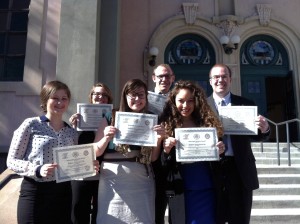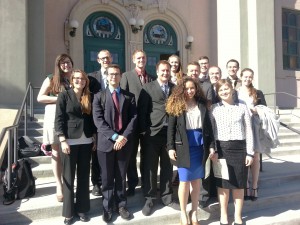BYU’s Model Arab League took first at its regional competition in Denver and went to the national competition in Washington, D.C., March 28 for the first time in 10 years.

Many league members were surprised by the good showing, as it was only their second year after a 10-year hiatus. Logan McDermott, a Middle Eastern studies and Arabic major in his first year with the league, said BYU surprised many of the schools in attendance.
“When we went into Denver nobody really thought we were going to do well,” he said. “Then we ended up getting first place, and it was really exciting.”
BYU’s 14 delegates received many awards for their performance in Denver, including three outstanding delegates, several honorable mention delegates and the top prize for overall outstanding delegation. Stefanie Stakland, a second-year member of BYU’s Model Arab League, said she’s proud of how the delegation performed.
“There were five or six other universities there that had been doing this for a while, so we were happy to win,” she said.
The Model Arab League is similar to the Model United Nations, but it deals with the countries in the Middle East. Delegates write resolutions, debate policy and pass reform they think would help the real Arab League. Colby Peterson, a senior in his second year with the delegation, said he hopes the Arab title doesn’t scare students away — it’s for students of all majors.

“I think a lot of the students, when they hear of the Model Arab League, think they need to know Arabic,” he said. “In truth, there is no Arabic spoken at the conference.”
McDermott agreed and said being a part of the Model Arab League was a good learning opportunity and a less expensive and less credit-intensive alternative to the Model United Nations.
“The experience as a whole was really good,” he said. “You gain a really strong perspective on how diplomacy is done and how to effectively compromise and strategize in order to achieve goals, especially given opposition from other forces.”
Though they took first at the regional competition, the team didn’t place at nationals. Stakland said they still had a good showing for their first year.
“Nationals was a lot more competitive; there were a lot of schools there,” she said. “We didn’t win it, but we still did well.”
Peterson added that even though they didn’t place, he hoped attending the event was a good learning experience so they could perform at an even higher level next year.
“It was a lot more competitive and cutthroat than Denver,” he said. “It was definitely a learning experience for everybody. It was our first time going to D.C., and so we we’re just kind of getting a feel for how that is, opposed to the regional competition.”
Most delegations brought about 20 students to the national competition in D.C. McDermott said BYU’s seven delegates were enough for its first year, but they’d like to increase the number in the future.
“We really just want all students to know they can join; it’s not just Middle Eastern and Arabic studies majors,” he said.
Students interested in joining the Model Arab League can sign up for the two-credit Model Arab League preparation class, IAS 354R next winter. The class time is spent in preparation for the competitions, which take place towards the end of the semester.




